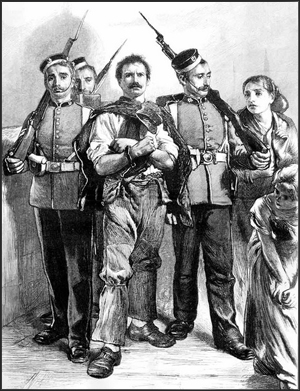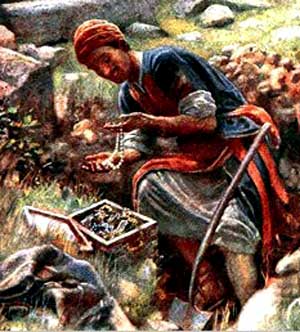 |
Catholic Virtues
Courage and Dedication
Plinio Corrêa de Oliveira
I was given two lines of Machiavelli to be analyzed, which I will do here. They show that even he can say things that are wise, which might surprise some of you. From time to time, however, men like him who are very cynical and corrupted have the insight to see something to its very depths.
Let us look, for example, at the following phrase: “Cursed be he who has more fear of danger than of evil!” (1)
Is it not true that this phrase gives shows keen insight?

The deserter, forever cursed in society |
What this phrase says is this: When a man faces a danger and he flees from it, he does wrong, he is cursed. When a man’s moral sense is so blunted that he fears danger more than sin, he is cursed.
For example, a man goes to fight in a just war. I know men who go to war only to look well before their family and friends. So, instead of going to war to fight for a just cause, a man goes to please the public opinion around him. Then, once he is at war, he realizes the real danger of losing his life or of becoming handicapped for the rest of his days. Fearing these dangers, he arranges a way to flee his duties and desert the battlefield.
That man, who feared the danger more than he loved his honor, will forever be considered a coward. This is a social curse. He feared danger more than he feared the evil caused by the enemy and more than the evil of dishonor.
Another example: A man is sightseeing with his wife and children. As the family enters an isolated area, some bandits appear and threaten them. The father flees to save his own skin, leaving his wife and children unprotected. This man feared that danger more that than he loved his family. Anyone who hears about his flight justly despises him. He incurred a social curse.
When the bandits appeared, he should have thought: “No matter what will happen, I cannot leave my wife and children unprotected. Therefore, I have to attack these bandits, whom I fear, before it is too late.” Even if he does not succeed, he will be regarded as a man who accomplished his duty. He will be respected.
This saying is of Machiavelli is so concise, so elevated, so true and formulated with such grandeur that it could be in Scriptures.
These are the insights that even completely corrupted persons can sometimes have. I am reading a book of quotes of famous authors, and it is surprising to find that one can find some lines made by the worse and even anti-Catholic authors that are as inspired as those of good Catholics. Thus, we can see that even the former are still touched by moments of grace and appelas of their conscience. Or perhaps the grace works as remorse in the depths of those souls. They resist the grace, but, from time to time, some truth like this appears.
Another of Machiavelli’s phrases is the following: “No one risks his whole fortune without risking all his forces.” (2)
In other words, the true fortune of the man is that for which he gives all his reserves and forces. When he does not risk everything for something, that thing is not his true treasure; it is not his true love. This follows a line in the Gospel, “Where your treasure is, there is your heart.” That is to say, you give everything you can for the thing that you love as your treasure.

Where is our heart there is our treasure |
It is very interesting for us to apply this phrase to ourselves and measure our own souls, to see if we are giving everything for the Cause of Our Lady, to see how much effort we are making for Her Cause. Afterwards, we should consider how much effort we make for other objectives. Finally, we can compare how much we give for them and how much we give for the Cause of Our Lady.
We should consider as well the partitions that at times we set up in our heart. How much care we take for the little things of the moment… For example, to appear well dressed and coiffeured, how much care we take in studying how prominent persons look in order to imitate them and appear well-placed also. How much care for these things! However, for the Cause of Our Lady, what effort do we expend?
In fact, a whole book could be written describing these vain efforts.
Another example is health. How many sacrifices persons are willing to make for their health? They submit themselves to poundings, tortures and diets. They undergo this not just for health, but also for beauty. There are rich ladies who, situated in such wealth and such bounty, nonetheless eat no more than what a starving beggar does. And this is only so that they do not become less beautiful… Do they not make this a kind of religion? They could call themselves religious sisters of the Diet. But if the Church imposes a fast on them, how would they react? Once again, where they expend their great efforts, there also lie their hearts.
Thus, whenever we turn our efforts in a certain direction, we should always ask ourselves, “Am I doing this for Our Lady?” And we will discover enormous cracks and fissures in our souls.
Here, then, is a suggestion for an examination of conscience for each one of us.

Posted September 14, 2011

Related Topics of Interest
 The Courage & Obedience of the Crusaders The Courage & Obedience of the Crusaders
 The Catholic Resistance to Nazism in Germany The Catholic Resistance to Nazism in Germany
 The Apostolate of Suffering The Apostolate of Suffering
 The Siege of the Alcazar in Toledo The Siege of the Alcazar in Toledo
 ‘Who Will Stand Up for Me against Evildoers?’ ‘Who Will Stand Up for Me against Evildoers?’
 The Military Virtues Every Catholic Must Have The Military Virtues Every Catholic Must Have

Related Works of Interest
|
|
Catholic Virtues | Religious | Home | Books | CDs | Search | Contact Us | Donate

© 2002- Tradition in Action, Inc. All Rights Reserved
|
 |
|